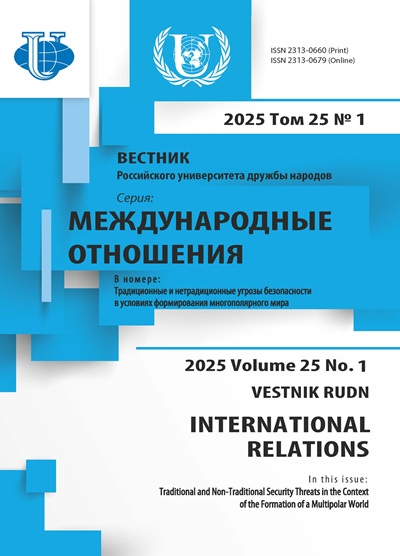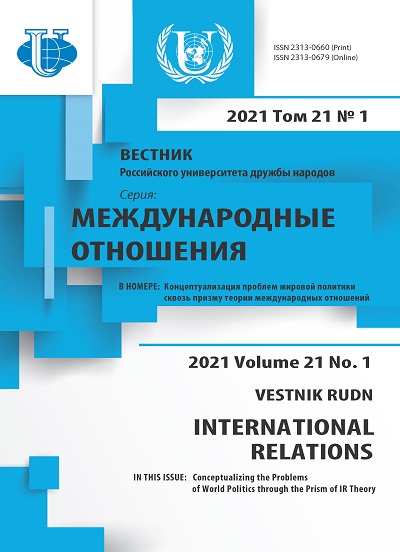Venezuelan Aspect of “Emerging Partnership” between Turkey and Latin America: Factors, Dynamics and Risks
- Authors: Piatakov A.N.1
-
Affiliations:
- Institute of Latin American Studies, Russian Academy of Sciences
- Issue: Vol 21, No 1 (2021): Conceptualizing the Problems of World Politics through the Prism of IR Theory
- Pages: 119-135
- Section: INTERNATIONAL ECONOMIC RELATIONS
- URL: https://journals.rudn.ru/international-relations/article/view/25961
- DOI: https://doi.org/10.22363/2313-0660-2021-21-1-119-135
Cite item
Full Text
Abstract
The article provides an analysis of Turkish-Venezuelan relations amid Turkey-Latin American ties enhancing. In 2015-2019, this way of intercontinental cooperation has reached a peak. This was reflected in the intensification of trade and economic relations, as well as in the strengthening of diplomatic ties. The author analyzes the causes and international factors of the ongoing rapprochement. The analysis is carried out by tracking the trajectory of the changes in Turkey's foreign policy from the perspective of its gradual departure from the pro-Western course. The main emphasis is placed on the evolution and current stage of the Turkish-Venezuelan relations. After periods of recession and boom by 2016 relations between Venezuela and Turkey had come into a turning point. In recent years, their bilateral partnership has been markedly distinguished on the background of Ankara’s relations with other states of the region. Venezuela has a record frequency of interstate official visits and a high degree of mutual understanding with the Turkish leadership on fundamental issues. The author carried out a comparative analysis of the two states’ political and historical special characteristics. The author comes to the conclusion that the format of Turkish-Venezuelan partnership is built on the basis of responding to common to the two states current external challenges. Both states are under sanctions pressure, although with a varying degrees of severity; both economies are experiencing crisis moments. These factors contribute to the development of economic interaction between the states on a mutually beneficial basis. For Venezuela, its economic cooperation with Turkey is a significant factor mitigating the negative effects of the permanent economic crisis. The supply of Turkish foodstuffs helps to reduce a food shortage, while Ankara's purchases of Venezuelan gold contribute to the replenishment of the Venezuelan budget with currency assets. We can talk about the existing geostrategic partnership, which has, if not long-term, then medium-term potential.
Full Text
Table 1. Non-regional partner trade with Latin American region (2016—2018)
Non-regional partner | Years | Import from Latin America, millions USD | Share in world export from Latin America, % | Export to Latin America, millions USD | Share in world import from Latin America, % |
European Union | 2016 | 114 022 | 14,2 | 123 946 | 13,5 |
2018 | 134 402 | 12,5 | 145 522 | 13 | |
China | 2016 | 102 396 | 11,5 | 113 155 | 12,4 |
2018 | 157 610 | 14,7 | 148 046 | 13,2 | |
India | 2016 | 18 206 | 2 | 10 293 | 1,1 |
2018 | 26 082 | 2,4 | 13 182 | 1,2 | |
Japan | 2016 | 22 721 | 2,5 | 26 732 | 2,9 |
2018 | 27 450 | 2,5 | 29 920 | 2,7 | |
Russia | 2016 | 6 928 | 0,7 | 5 206 | 0,5 |
2018 | 8 319 | 0,7 | 7 604 | 0,7 | |
Turkey | 2016 | 5047 | 0,5 | 1 935 | 0,2 |
2018 | 8 561 | 0,8 | 3 244 | 0,3 | |
Iran | 2016 | 1 671 | 0,2 | 189 | 0,02 |
2017 | 1 095 | 0,1 | 69 | 0,006 |
Source: UN COMTRADE. URL: https://trademap.org (accessed: 20.01.2020).
Table 2. Turkey’s external trade with the key Latin American countries (2018)
Country / criteria | Import, millions USD | Share | Increase | Export, millions USD | Share in Turkey’s export, % | Increase |
Brazil | 3 257 | 1,5 | 18 | 489 | 0,3 | –11 |
Colombia | 1 888 | 0,8 | 27 | 241 | 0,1 | 6 |
Venezuela | 1 019 | 0,5 | 54 | 120 | 0,1 | 29 |
Mexico | 634 | 0,3 | –9 | 600 | 0,4 | 17 |
Uruguay | 497 | 0,2 | 75 | 44 | 0 | –3 |
Chile | 370 | 0,2 | 36 | 386 | 0,2 | 18 |
Argentina | 357 | 0,2 | 9 | 169 | 0,1 | 7 |
Peru | 108 | 0 | 10 | 162 | 0,1 | –16 |
Paraguay | 107 | 0 | –15 | 39 | 0 | 10 |
Panama | 41 | 0 | 35 | 238 | 0,1 | 5 |
Bolivia | 92 | 0 | 195 | 20 | 0 | 8 |
Cuba | 11 | 0 | –8 | 32 | 0 | 29 |
Latin America | 8 561 | 0,5 | – | 3 244 | 0,2 | – |
Source: UN COMTRADE. URL: https://trademap.org (accessed: 20.01.2020).
About the authors
Andrei Nikolaevich Piatakov
Institute of Latin American Studies, Russian Academy of Sciences
Author for correspondence.
Email: anpyatakov@yandex.ru
PhD in Political Sciences, Leading Research Fellow, Political Studies’ Center, Institute of Latin America
Moscow, Russian FederationReferences
- Ataman, M. (2008). Leadership Change: Özal’s Leadership and Restructuring in Turkish Foreign Policy. Alternatives. Turkish Journal of International Relations, 7(1), 77—96.
- Avatkov, V.A. (2019). Turkey Today. Key Trends in Political Course. Svobodnaya mysl’, (2), 141—146. (In Russian).
- Borobkov, I.I., Kosarev, V.A., Vilovatykh, A.V., Glazova, A.V., Mikhailov, S.A., et al. (2019). The Trump Administration’s Middle Eastern Policy as a Reflection of the “America First” Slogan. Problems of National Strategy, (2), 11—51. (In Russian).
- Borzova, A.Yu., & Savicheva, E.M. (2017). The Main Characters of Arab Migration to Latin America. Latinskaia Amerika, (8), 48—59. (In Russian).
- Druzhilovsky, S.B. (2016). The Internal Causes of Political Instability in the Republic of Turkey. MGIMO Review of International Relations, (2), 15—21. (In Russian).
- González Levaggi, A.S., & Ferez, M. (Eds.). (2016). Turquía — América Latina y el Caribe. Una asociación emergente. Istambul: Basim Tarihi. (In Spanish).
- González Levaggi, A.S. (2012). América Latina y el Caribe, la última frontera de la “Nueva” Politica exterior de Turquia. Araucaria. Revista Iberoamericana de Filosofía, Política y Humanidades, 14(28), 179—202. (In Spanish).
- Ivanovsky, Z.V. (2019) Political Polarization in Latin America. Results of the Electoral Cycle. Svobodnaya mysl’, (1), 149—198. (In Russian).
- Kudeyarova, N.Yu. (2016). The Latin America Migratory Processes Periodization. Latinskaia Amerika, (7), 68—74. (In Russian).
- Kumaraswamy, P.R. (2002). India and Israel: Emerging Partnership. Journal of Strategic Studies, 25(4), 192—206.
- Nweihed, K.G., Rojas, R., & Necati Kutlu, M. (2009). Bolívar y Atatürk, Atatürk y Bolívar. Caracas: Ediciones OPSU. (In Spanish).
- Ozkan, M. (2011). Turkey’s New Engagement in Africa and Asia. Perceptions. Journal of International Affairs, 16(3), 111—137.
- Razumosky, D.V. (2006). Trade Cooperation between Latin America and Exrtaregional Partners. Latinskaia Amerika, (3), 5—21. (In Russian).
- Rozental, D.M. (2016). The Dragon over Caracas. Relations between China and Venezuela in the Beginning of the XXI Century. Latinskaia Amerika, (3), 39—50. (In Russian).
- Rozental, D.M. (2018). The Venezuelan Node in the Latin American Policy of Moscow. Latinskaia Amerika, (10), 49—60. (In Russian).
- Shlykov, P.V. (2019). Turkish-American Relations in the Mirror of Middle Eastern and Euro-Atlantic Dimensions. Current Problems of Europe, (1), 184—228. (In Russian). doi: 10.31249/ape/2019.01.09
- Shumilov, M.M., & Nurullayev, Sh.K. (2019). S-400 Anti-Aircraft Missile System as a Factor of Turkish-American Relations. Eurasian Integration: Economics, Law, Politics, (2), 93—102. (In Russian).
- Sudarev, V.P., & Simonova, L.N. (Eds.). (2017). Latin America on Fracture of Global Regional Trends. Moscow: ILA RAN publ. (In Russian).
- Sudarev, V.P., Harlamenko, A.V., & Sherbakova, A.V. (2012). Iran and Latin America. Latinskaia Amerika, (11), 41—53. (In Russian).
- Suleymanov, A.V. (2013). Turkey, Iran, USA and the Iraq Crisis of 2003 Year. Izvestiya of Saratov University. New Series. Series: History, International Relations, 33(4), 162—169. (In Russian).
- Suleymanov, A.V. (2014a). New Era of Relations between Turkey and Latin America. Latinskaia Amerika, (10), 59—73. (In Russian).
- Suleymanov, A.V. (2014b). Major Problems of Contemporary Turkish Foreign Policy. Vestnik of Saint-Petersburg University. Political Science. International Relations, (3), 162—169. (In Russian).
- Suleymanov, A.V. (2015). A. Davutoglu’s Ideology of Turkish Foreign Policy. Vestnik RUDN, International Relations, 15(3), 135—143. (In Russian).
- Temel, M. (2004). XIX. ve XX. Yüzyılda Osmanlı Latin Amerika İlişkileri. Istanbul: Nehir yayınları — kelepir. (In Turkish).
- Toogood, K. (2016). Understanding the Emerging Relationship between China and Africa: The Case of Nigeria. Stimson Center Research Report, (1), 1—10.
- Ulchenko, N.Yu. (2019). On the Issue of Changing the Economic Policy of Turkey in the Face of Increasing Presidential Power. Institute of Oriental Studies of RAS Works, (20), 10—18. (In Russian).
- Ulchenko, N.Yu. (Eds.). (2017). Justice and Development Party’s Reign: Preliminary Results and Forecasts (2002—2015). Moscow: Institut vostokovedeniya RAN publ. (In Russian).
- Vorotnikova, T.A. (2018). Contradicciones campesino-indígenas en Bolivia contemporánea. Iberoamerica, (1), 120—142. (In Spanish).
- Vorotnikova, T.A. (2019). India — New Player on Venezuela’s Field (to the 60th Anniversary of India — Venezuela Diplomatic Relations). Asia and Africa Today, (4), 17—23. (In Russian). doi: 10.31857/S032150750004378-7
- Yakovlev, P.P. (2019). Venezuela’s Crisis in an Era of Conflictual Multipolarity. Perspektivy, 1(17), 38—52. (In Russian). doi: 10.32726/2411-3417-2019-1-38-52
- Yeşiltaş, M. (2013). The Transformation of the Geopolitical Vision of Turkish Foreign Policy. Turkish Studies, 14(3), 661—687. doi: 10.1080/14683849.2013.862927











